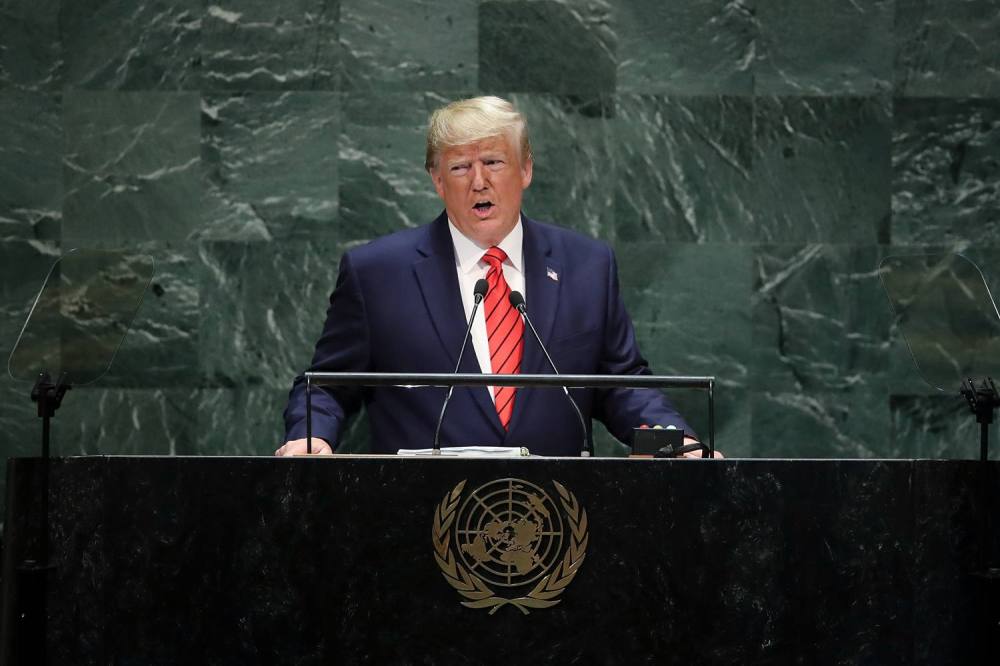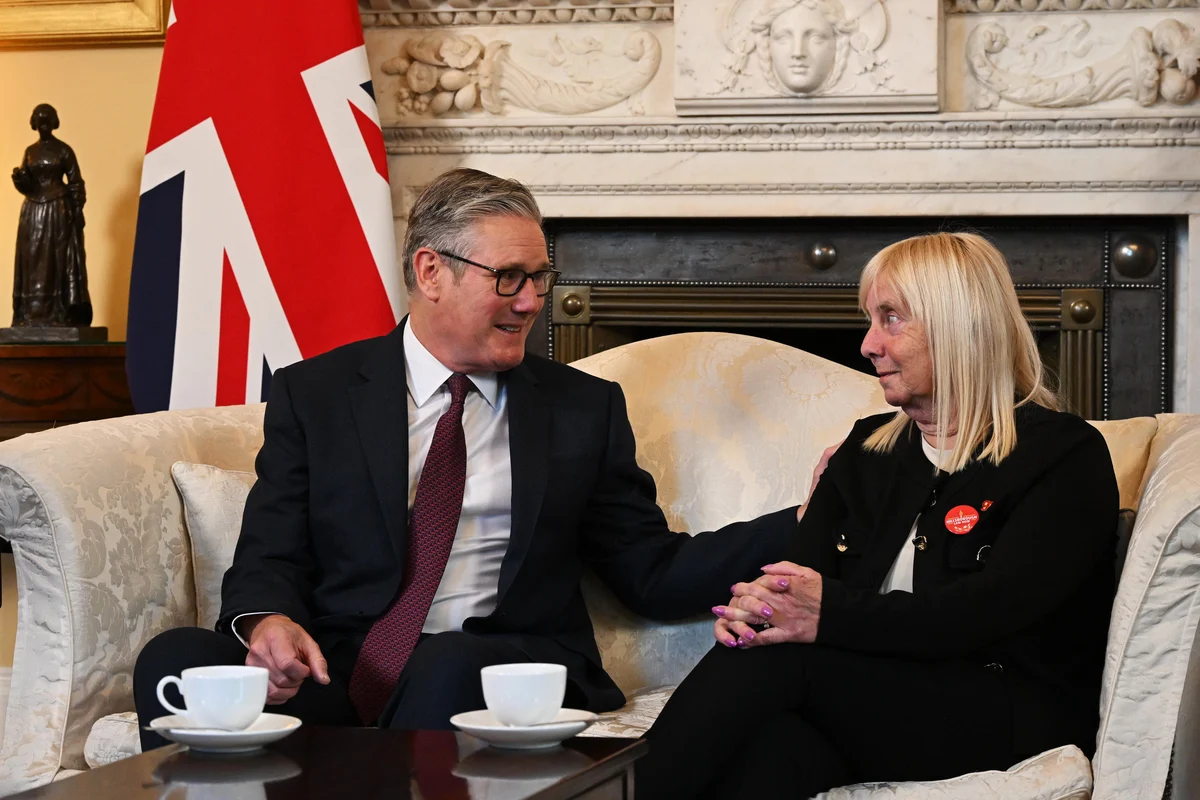
Welcome back to Foreign Policy’s Situation Report. We’re just a few days away from the 80th United Nations General Assembly. Remember to keep an eye out for pop-up editions of SitRep! Rishi and John will be running around Turtle Bay all week to offer you the most important (and juiciest) details on what’s happening. FP will also be hosting several public events alongside the gathering, including the Her Power summit and forums on energy, health, and technology, which you can sign up for here.
Alright, here’s what’s on tap for the day: We explain what we’re watching for at UNGA, the United States and United Kingdom sign a tech cooperation deal, and Pakistan and Saudi Arabia make a mutual defense pact.
Turbulent Waters
World leaders and diplomats will flood into New York City in the coming days for the annual high-level week of the United Nations General Assembly (UNGA), which kicks off on Monday. This year marks the 80th session of UNGA—and it comes at a challenging moment for the world and the U.N. itself.
Though the U.N. is celebrating its 80th birthday this year, it’s not an entirely happy one. The intergovernmental body’s utility has increasingly been called into question in recent years as it has struggled to prevent and halt conflicts across the globe, including the wars in Gaza and Ukraine—issues that will be at the top of the agenda at UNGA next week.
Meanwhile, U.S. President Donald Trump has been among the U.N.’s most outspoken critics. The fact that he’s the leader of the nation that both hosts the U.N.’s headquarters and provides a major source of its funding makes Trump a significant source of uncertainty for the global body. He will be the elephant in the room at UNGA—and he doesn’t even have a Senate-confirmed ambassador in place at the U.N., with Mike Waltz’s nomination held up.
Better together? Trump, whose “America First” foreign policy is a direct rebuke of multilateralism, has often accused the U.N. of being ineffective and taking advantage of the United States. He slashed funding to the U.N. as part of broader cuts on foreign aid and pulled the United States out of several U.N. agencies, including the World Health Organization and UNESCO as well as the U.N. Human Rights Council, and the U.N.-orchestrated Paris climate accords.
In a sign that the U.N. is eager to demonstrate its usefulness as an important forum for dialogue between countries on geopolitical problems, the theme of UNGA this year is “Better together: 80 years and more for peace, development and human rights.”
Yet U.N. chief António Guterres acknowledged the uphill battle that the organization faces in comments at a press conference earlier this week. “Some call it the World Cup of diplomacy,” Guterres said of UNGA. “But this cannot be about scoring points—it must be about solving problems. There is too much at stake.”
He added that “[w]e are gathering in turbulent—even uncharted—waters,” warning of widening geopolitical divides in the face of an array of global problems that are placing strains on international cooperation.
About those divides… Speaking of issues straining global cooperation and driving divisions—the war in Gaza will be at the center of discussions during high-level week, which is set to begin just days after an independent commission set up by the U.N. Human Rights Council concluded that Israel is committing genocide in the enclave.
Multiple countries, including France and the United Kingdom, are expected to formally recognize Palestine as a state at UNGA. Though these moves will be mostly symbolic, they’re a sign of growing global opposition to Israel’s prosecution of the war in Gaza—including from Western countries.
The United States has blocked the entire traveling Palestinian delegation from gaining visas to attend UNGA—a move that applies to Palestinian Authority President Mahmoud Abbas and approximately 80 other Palestinian Authority and Palestine Liberation Organization officials. The broad visa ban is unprecedented and seen by experts as a violation of a 1947 U.N. agreement that requires the United States to provide representatives of U.N. members and other officially invited people unimpeded access to U.N. headquarters in New York City. (Palestine is not a U.N. member but has been granted nonmember observer status.) However, the U.S. State Department said in its announcement that the Palestinian Authority’s mission to the U.N. “will receive waivers per the UN Headquarters Agreement.”
The war in Ukraine will also be a big topic of discussion at UNGA. Since reentering the White House, Trump has unsuccessfully pushed for a peace agreement between Kyiv and Moscow. U.S. Secretary of State Marco Rubio said this week that Trump is likely to meet with Ukrainian President Volodymyr Zelensky on the sidelines of UNGA for further talks.
We’ll be watching to see how conversations on Gaza and Ukraine play out, what leaders say when they address the assembly (particularly Trump), and whether UNGA concludes without any fireworks amid a contentious era in recent history.
Other issues expected to be front and center at UNGA include Iran and its nuclear program (and related sanctions), where Syria goes from here, challenges presented by artificial intelligence, climate change, and more.
Let’s Get Personnel
The killing of right-wing media personality Charlie Kirk could have some wide-ranging consequences on the Pentagon’s rank and file. Secretary of Defense Pete Hegseth has ordered the department to monitor social media posts of service members that are deemed to be critical of Kirk or to “celebrate” his death in any way. “We are tracking all these very closely — and will address, immediately. Completely unacceptable,” Hegseth wrote in a post on X. At least a half dozen service members have reportedly been suspended as their social media posts are being investigated.
Hegseth is also going after military troops’ grooming habits. In a memo sent last month but made public this week, he wrote that the “grooming standard set by the U.S. military is to be clean shaven and neat,” and any service members not adhering to that standard will require a medical exemption. Those who obtain a medical waiver to keep their facial hair will submit to a treatment plan; if, after a year of treatment, they still require a medical waiver, they will be made to undergo “separation” from the military, he added.
On the Button
What should be high on your radar, if it isn’t already.
London deals. Trump and U.K. Prime Minister Keir Starmer on Thursday signed an agreement to increase cooperation on technology.
Dubbed the Technology Prosperity Deal, the agreement includes pledges for the two countries to cooperate on artificial intelligence, nuclear energy, and quantum computing, with the United Kingdom also committing to “achieve full independence from Russian nuclear fuel” by the end of 2028.
Starmer also touted 250 billion pounds ($338.8 billion) “flowing both ways across the Atlantic” in a press conference with Trump, calling it a “record.” That includes a 100 billion pound ($135.5) pledge from U.S. investment company Blackstone and 1.5 billion pounds ($2 billion) from U.S. defense tech company Palantir to invest in the United Kingdom. There’s also plenty of money flowing the other way, with U.K. pharmaceutical giant GSK investing $30 billion in the United States and energy company BP committing to invest $5 billion per year in its U.S. business over the next five years.
Pakistan-Saudi pact. Pakistan and Saudi Arabia on Wednesday signed a mutual defense pact during Pakistani Prime Minister Shehbaz Sharif’s visit to Riyadh. The deal, which Sharif signed with Saudi Crown Prince Mohammed bin Salman, deepens defense cooperation between the two countries and commits them to defending each other in the event of an attack.
“The agreement states that any aggression against either country shall be considered an aggression against both,” the Pakistani government said in a statement.
Pakistan is a nuclear power, though, while Saudi Arabia is not. Asked whether Pakistan would now be obliged to provide Saudi Arabia with a nuclear umbrella, a senior Saudi official told Reuters: “This is a comprehensive defensive agreement that encompasses all military means.”
Gaza blackout. Israeli forces pushed farther into Gaza City on Thursday as part of their latest military offensive, with residents of the territory reportedly facing a temporary internet and telephone blackout as Israeli tanks moved closer to the city center. The Israeli military, which ordered the city’s occupants to relocate to what it calls a “humanitarian zone” in southern Gaza ahead of the expanded offensive, said that more than 350,000 people had already fled the city by Tuesday evening, with roughly half a million others still remaining.
The renewed assault in a conflict that has killed more than 65,000 Palestinians comes despite mounting global pressure on Israel. U.S. Sen. Bernie Sanders issued a statement on Wednesday titled “It Is Genocide” in which he became the first sitting U.S. senator to characterize Israel’s actions in Gaza using that term. “If there is no accountability for [Israeli Prime Minister Benjamin] Netanyahu and his fellow war criminals, other demagogues will do the same,” Sanders warned.
Snapshot
Hot Mic
Rishi sat down on Wednesday with Sakari Puisto, Finland’s minister for economic affairs, who is visiting Washington to attend this week’s Quantum World Congress with a delegation representing around a dozen Finnish quantum companies. Finland is pouring immense resources into leading in the emerging technology, with Puisto saying that the country has committed to spending 4 percent of its GDP on research and development by 2030.
It has also made another commitment as the newest member of NATO, pledging with other members earlier this year to spend 5 percent of its GDP on defense by 2035.
“We are doing it—it’s necessary,” Puisto said, pointing out that that’s especially true of Finland as one of Russia’s neighbors. “But fiscally, it’s not easy; we need to essentially find the money.”
His remarks reflect a conversation we heard repeatedly at this year’s NATO summit, with European leaders now in the position of putting their money where their mouths are and coming up with additional spending.
Put on Your Radar
Monday, Sep. 22: France and Saudi Arabia co-host a summit on a two-state solution for Israel and Palestine on the sidelines of UNGA.
Tuesday, Sep. 23: Trump speaks at UNGA and hosts a reception for world leaders in attendance.
Wednesday, Sep. 24: Zelensky and Iranian President Masoud Pezeshkian speak at UNGA.
The U.N. Security Council holds an open debate on artificial intelligence.
Friday, Sep. 26: Netanyahu and Starmer address UNGA.
NATO chiefs of defense are scheduled to meet in Latvia’s capital, Riga.
Saturday, Sep. 27: U.N. “snapback” sanctions on Iran are scheduled to go into effect unless a deal is reached.
Quote of the Week
“After years of complaining about cancel culture, the current administration has taken it to a new and dangerous level.”
—Former U.S. President Barack Obama criticizing the Trump administration’s role in comedian Jimmy Kimmel’s talk show being indefinitely suspended in response to Kimmel’s remarks about Charlie Kirk’s death.
This Week’s Most Read



